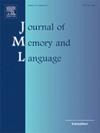Interference in the formation of filler-gap dependencies: Evidence from Hebrew relative clauses
IF 3
1区 心理学
Q1 LINGUISTICS
引用次数: 0
Abstract
Much research in sentence processing has shown that the formation of syntactic dependencies is susceptible to interference from structurally irrelevant distractors. Interference may occur during encoding of a dependent, or during its retrieval. Filler phrases participating in filler-gap dependencies were argued to be encoded robustly and maintained actively in memory, raising the possibility that fillers are immune to interference. In two self-paced reading and two offline comprehension experiments, we look for online and offline evidence for interference in Hebrew relative clauses, using the gender feature to manipulate similarity between the filler and a distractor. In the self-paced reading experiments, we find weak evidence for facilitatory interference in ungrammatical sentences, but no evidence for inhibitory interference in grammatical sentences. In the offline comprehension experiments, we find robust evidence for interference in grammatical sentences, reflected in low comprehension accuracy. The results demonstrate that fillers are prone to interference similarly to other items in memory. We further show that interference is unaffected by the use of gender as a retrieval cue, in contrast to predictions made by cue-based retrieval models, and propose a novel account for so-called “encoding interference” effects.
填空依存关系形成过程中的干扰:来自希伯来语相对从句的证据
大量的句子加工研究表明,句法依赖的形成容易受到结构无关干扰因素的干扰。干扰可能发生在依赖性编码或检索过程中。参与填充-间隙依赖的填充短语被认为是健壮的编码,并在内存中主动维护,提高了填充不受干扰的可能性。在两个自定节奏阅读和两个离线理解实验中,我们利用性别特征来操纵填充词和干扰词之间的相似性,寻找在线和离线干扰希伯来语关系从句的证据。在自定节奏阅读实验中,我们发现在非语法句中有微弱的促进干扰证据,而在语法句中没有抑制性干扰证据。在离线理解实验中,我们发现了对语法句子干扰的有力证据,这体现在较低的理解准确率上。结果表明,填充物与记忆中的其他项目一样容易受到干扰。我们进一步表明,与基于线索的检索模型的预测相反,使用性别作为检索线索的干扰不受影响,并提出了所谓的“编码干扰”效应的新解释。
本文章由计算机程序翻译,如有差异,请以英文原文为准。
求助全文
约1分钟内获得全文
求助全文
来源期刊
CiteScore
8.70
自引率
14.00%
发文量
49
审稿时长
12.7 weeks
期刊介绍:
Articles in the Journal of Memory and Language contribute to the formulation of scientific issues and theories in the areas of memory, language comprehension and production, and cognitive processes. Special emphasis is given to research articles that provide new theoretical insights based on a carefully laid empirical foundation. The journal generally favors articles that provide multiple experiments. In addition, significant theoretical papers without new experimental findings may be published.
The Journal of Memory and Language is a valuable tool for cognitive scientists, including psychologists, linguists, and others interested in memory and learning, language, reading, and speech.
Research Areas include:
• Topics that illuminate aspects of memory or language processing
• Linguistics
• Neuropsychology.

 求助内容:
求助内容: 应助结果提醒方式:
应助结果提醒方式:


